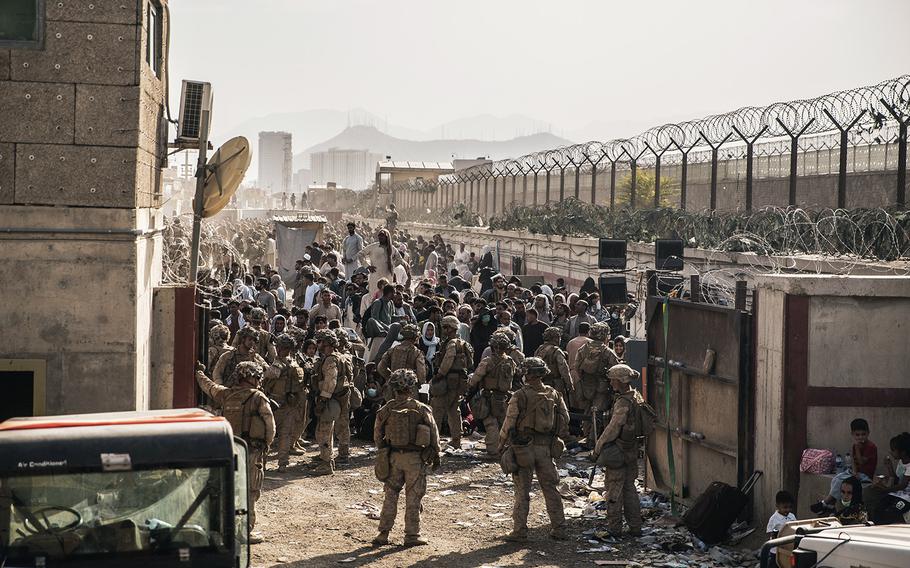Middle East
Biden administration failed to foresee Afghanistan mayhem, review finds
The Washington Post June 30, 2023

U.S. Marines with Special Purpose Marine Air-Ground Task Force - Crisis Response - Central Command, provide assistance at an evacuation control checkpoint during an evacuation at Hamid Karzai International Airport in Kabul, Afghanistan. (Victor Mancilla/U.S. Marine Corps)
A State Department report released Friday finds fault with the Biden administration's crisis management and awareness before and during the fall of Afghanistan, an affirmation of critics who have said that bureaucratic lethargy and failure of imagination played significant roles in the chaos and violence that unfolded during one of the administration's darkest moments.
The report, the unredacted version of which is 21 pages, is sharply critical of the U.S. government's handling of the most serious evacuation crisis since the fall of Saigon. The problems ranged from the very top - a failure of former president Donald Trump and President Biden to appreciate the consequence of a U.S. military pullout on the stability of the Afghan government - to the low-level, as standard summer diplomatic rotations in the weeks ahead of the collapse of Kabul left the U.S. evacuation in the hands of diplomats who in some cases had only been in the country for a few days or weeks, the review found.
The report is sure to offer fuel to the sharpest critics of Biden's handling of the crisis, which left Afghanistan in the hands of the Taliban, cost the lives of scores of Afghans and at least 13 U.S. service members, and sent the president's approval ratings tumbling. The timing of the release - with little notice ahead of a long holiday weekend - was also likely to draw anger from critics who have said the Biden administration has tried to downplay scrutiny of its actions.
"What this report reveals is that in crises that are longer duration, that are particularly complicated, that occur at a large scale, that impact populations well beyond the official American community, we haven't over time had the appropriate structure and resources available to provide that foundation, a steady, constant set of capabilities that we can draw on when we're suddenly confronting something at scale," said a senior State Department official, briefing reporters under ground rules of anonymity.
Among its findings was that although the U.S. military began planning for a full evacuation of Kabul "for some time" ahead of when it started in mid-August 2021, the State Department's participation in the planning "was hindered by the fact that it was unclear who in the Department had the lead."
Senior U.S. officials gave "insufficient senior-level consideration of worst-case scenarios" ahead of the August 2021 collapse of the Afghan government, according to the report.
The U.S. exit from Afghanistan, capped by a chaotic and deadly two-week evacuation from a single airfield in Kabul in August 2021, pulled more than 120,000 people from harm's way in an extraordinary airlift effort spearheaded by the U.S. military. But tens of thousands more who had assisted the American war effort were left behind in an effort that was marked throughout by chaos and violence, including a suicide bombing by the Islamic State that killed 13 U.S. troops and about 170 Afghans, a U.S. drone strike that mistakenly killed three adult civilians and seven children, and surging crowds that trampled some people to death.
The evacuation began with the U.S. military rushing thousands of troops back to Kabul after recently withdrawing all but a few hundred of them. In a hastily arranged and shaky agreement, Taliban forces - long a U.S. battlefield adversary - provided security outside the airport while U.S. troops oversaw the airfield itself and attempted to make sense of who deserved to flee.
In an earlier investigation of the evacuation carried out by the U.S. military, numerous officials voiced frustration with what they perceived to be a lack of attention in Washington to how dire the situation was in Afghanistan as the Taliban swept across the country in spring and summer 2021.
Military personnel would have been "much better prepared to conduct a more orderly" evacuation, said Navy Rear Adm. Peter Vasely, the top U.S. commander on the ground during the operation, "if policymakers had paid attention to the indicators of what was happening on the ground."
Vasely's comments, and other similar remarks, were downplayed by State Department officials in February 2022 after they were initially released through the Freedom of Information Act to The Washington Post. Jalina Porter, a State Department spokeswoman, said then that "cherry-picked comments do not reflect the months of work that were well underway" and the totality of what U.S. diplomats undertook to facilitate the evacuation effort.
Another Biden administration spokesman, John Kirby, also has downplayed how chaotic the effort was, saying as recently as this April that he didn't "buy the whole argument of chaos" during the operation.
"It was tough in the first few hours," Kirby said. "You would expect it to be; there was nobody at the airport and certainly no Americans. It took time to get in there."